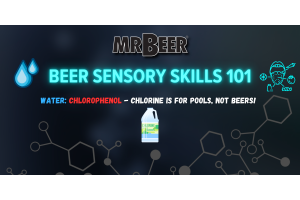Hops 101

What are Hops?
Hops are cone-shaped flowers that grow on a vine, and serve as the spice in brewing beer. There are dozens of varieties, each with a different flavor and character that can be used by brewers to shape their creations. American hops often have strong citrus and pine flavors. European varieties impart softer earth, spice, and floral flavors. Hops can even produce woodsy or berry-like flavors. Hops also are responsible for beer's aroma—pouring a fresh pale ale or pilsner into a glass will release wonderfully complex scents which come from the hops used in these beers. In addition to flavor, hops also contribute to beer's bitterness. While bitterness may not sound like a desirable thing, it's actually important: bitterness balances out the sugars left in the beer after fermentation. If you were to make a homebrew with just grain, yeast, and water, most people would find it too sweet. Some styles, like the brown ale or hefeweizen, minimize the apparent bitterness and use just enough delicately-flavored hops to bring things into balance. Others, like IPAs, intentionally use assertive hops and showcase the bitter qualities (along with other hop flavors). Hops are most commonly available in two forms:
- Whole leaf hops
- Pellet hops
Whole leaf hops are harvested from the vine and dried without much other processing and they still retain most of their cone-like shape.

Pellets are the most popular, and are made from hop cones that are crushed and pressed into a shape that looks like rabbit food.
 While these two styles do have a few differences, you can substitute one for the other without having to make any drastic recipe adjustments. Pellet hops have the benefit of being less expensive and take up less space, but some homebrewers find that whole leaf hops are easier to work with and clean up.
While these two styles do have a few differences, you can substitute one for the other without having to make any drastic recipe adjustments. Pellet hops have the benefit of being less expensive and take up less space, but some homebrewers find that whole leaf hops are easier to work with and clean up.
You also might find hops sold as "plugs" on occasion. These are whole leaf hops that are crushed and pressed, but not as much as a pellet. Plugs are priced similarly to whole leaf hops.
When you buy hops, you'll probably find a % AA marked somewhere on the package. This number is the percentage of alpha acids by weight in the package. Alpha acids produce the bitterness in hops, so this percentage suggests how bitter one hop variety is compared to another. For example, a popular American hop called Cascade is generally rated 6% AA, while another type called Magnum is around 12%. If you make two versions of the same beer recipe, one using Cascade hops and the other using the same amount of Magnum hops, you will find the second one much more bitter (and differently flavored in general).
Using Hops
Now I'm going to explain how hops are typically used, then I will explain how hops are used with our kits. As you are about to see, we cut out a lot of the work so you can make your beer simply and quickly.
First, let's talk about how hops are used in a typical brewing scenario:
When brewing beer, hops are added during the part of the brewing process called "the boil," which is exactly what it sounds like. For a brewer who uses unhopped malt extract, the boil happens after you've dissolved the extract in water. At this point the liquid is called "wort" and it's typically boiled for a total of 60 minutes. Once you bring the wort up to a vigorous boil, a typical all-grain or extract recipe will call for hop additions at different times. The list of when to add the hops is called the "hop schedule". A hop schedule always lists the length of time that the hops should be in the boil, not the amount of time you should wait to add the hops. The reason hop schedules are written like this is because the amount of time that hops are boiled changes their flavor.  Hops that are boiled for 60 minutes will impart strong bitterness but very few other flavors. Hops boiled for 10 or 20 minutes will contribute a lot of flavor and some bitterness. Hops boiled for one to five minutes will add distinct aromas and flavor to the beer, but not much bitterness.
Hops that are boiled for 60 minutes will impart strong bitterness but very few other flavors. Hops boiled for 10 or 20 minutes will contribute a lot of flavor and some bitterness. Hops boiled for one to five minutes will add distinct aromas and flavor to the beer, but not much bitterness.
Because our malt extract cans are pre-hopped, there is no need to add hops for bittering. This cuts out almost a whole hour that would normally be required making your beer. And since our kits already have the bittering hops, the hops you add will only contribute to flavor and aroma.





